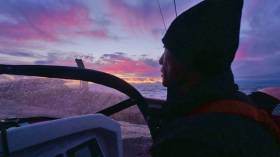Displaying items by tag: Qingdao China
Search For Missing Chinese Sailor Guo Chuan Called Off
#GuoChuan - Record-setting Chinese offshore skipper Guo Chuan has gone missing on a solo crossing of the Pacific, according to BBC News.
Guo Chuan had connections with Ireland as a crew-member on Irish-Chinese backed Green Dragon and became the first-ever Asian participant, with skipper Ian Walker in the 2008/09 Volvo Ocean Race
US Coast Guard teams now suspended their search in the waters off Hawaii where Guo’s boat was spotted abandoned shortly after his support team lost contact on Tuesday morning Irish time.
Guo’s yacht, the Qingdao China, was reportedly seen from a search plane with its main sail snapped off some 1,000km off Oahu.
Rescuers boarding the boat later found his lifejacket among his belongings.
The experienced sailor had been attempting to break the speed record for a solo Pacific crossing, which currently stands at 21 days.
A year ago, Irish offshore sailor Jarlath Cunnane was among the first to congratulate Guo on a record transit of the North East Passage with a team on board his 26.5m trimaran.
China’s best-known sailor previously sailed around the world in a 12m yacht in 2013.
* The USCG has suspended the search:
UPDATE: COAST GUARD SUSPENDS SEARCH FOR MISSING CHINESE TRANS-PACIFIC MARINER
HONOLULU — The Coast Guard suspended the active search Wednesday evening for a Chinese mariner who was unreported while sailing his 97-foot super trimaran across the Pacific.
Guo Chuan, 50, remains missing.
"Mr. Chuan was a professional mariner with a deep passion for sailing," said Capt. Robert Hendrickson, chief of response, Coast Guard 14th District. "Our thanks to our Navy partners who helped us search for this vessel in a timely manner so far from shore in an attempt to locate Mr. Chuan. Our deepest condolences go out not only to his family and friends but also to his racing team and the sailing community."
Coast Guard HC-130 Hercules crews conducted six search patterns in the vicinity of the Quindao China and its charted course following notification of the situation Tuesday and into Wednesday. The USS Makin Island deployed an MH-60 Seahawk helicopter Wednesday once they were in range to attempt contact with Chuan. Their hails over the radio went unanswered and weather conditions prevented safe deployment of a rescue swimmer to the vessel. They followed up by deploying a rigid-hulled inflatable boat and crew to conduct a boarding of the trimaran Wednesday afternoon. The boatcrew confirmed Chuan was not on the vessel although his life jacket remains aboard.
Weather on scene was reportedly 23 mph winds, seas to 5-feet with good visibility and scattered clouds.
On-scene assets searched a total area of more than 4,600 square miles over the two-day period.
Involved in the search were:
- HC-130 Hercules airplane crews from Coast Guard Air Station Barbers Point
- USS Makin Island (LHD 8) homeported out of San Diego
- Navy MH-60 Seahawk helicopter crew attached to the USS Makin Island
The Quindao China remains adrift, the mainsail has been doused and the vessel has been marked. A broadcast notice to mariners alerting vessel crews in the area to the potential hazard to navigation has been issued. Chuan’s racing team is making arrangements to recover the vessel.
Tuesday morning, watchstanders at the Coast Guard Joint Rescue Coordination Center Honolulu received notification from Maritime Rescue Coordination Center China personnel that the vessel Qingdao China, with one person aboard, had not been heard from for 24 hours prompting the response.
The Makin Island is an amphibious assault ship attached to the Makin Island Amphibious Ready Group and 11th Marine Expeditionary Unit that departed Naval Station San Diego for a scheduled deployment, Oct. 14, to provide maritime security operations, crisis response capability, theater security cooperation and forward naval presence in the Pacific.




























































